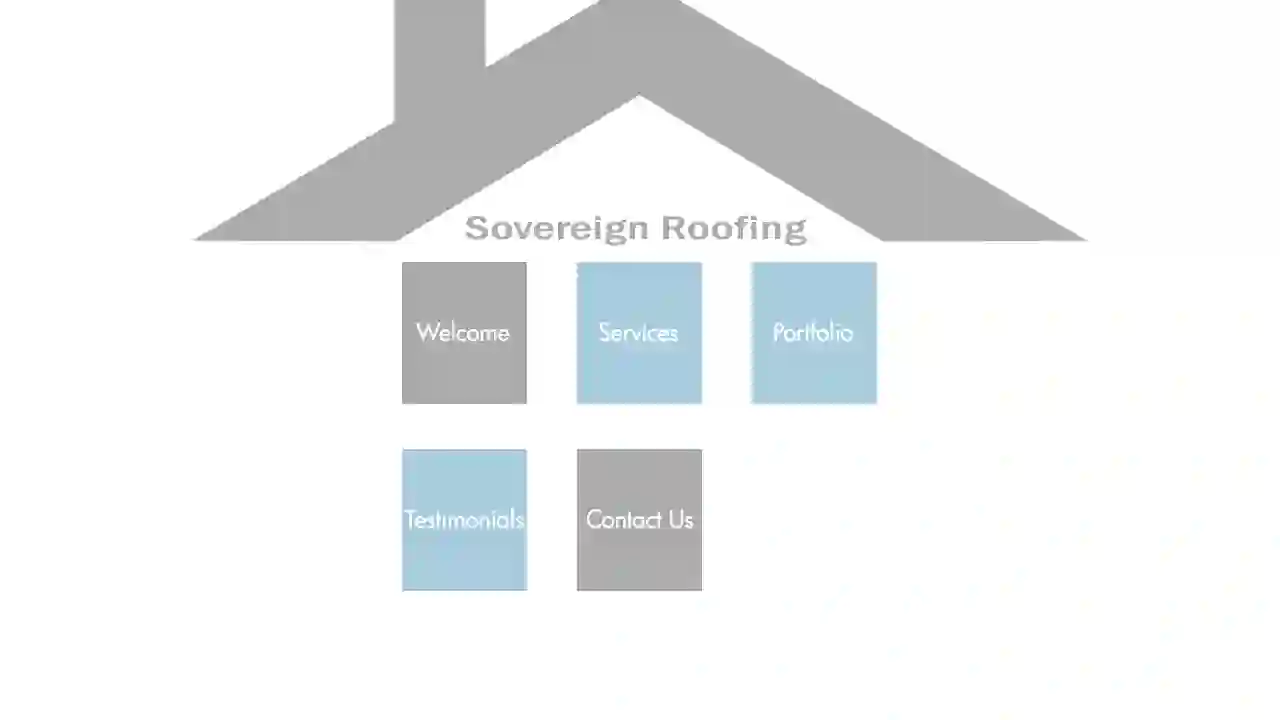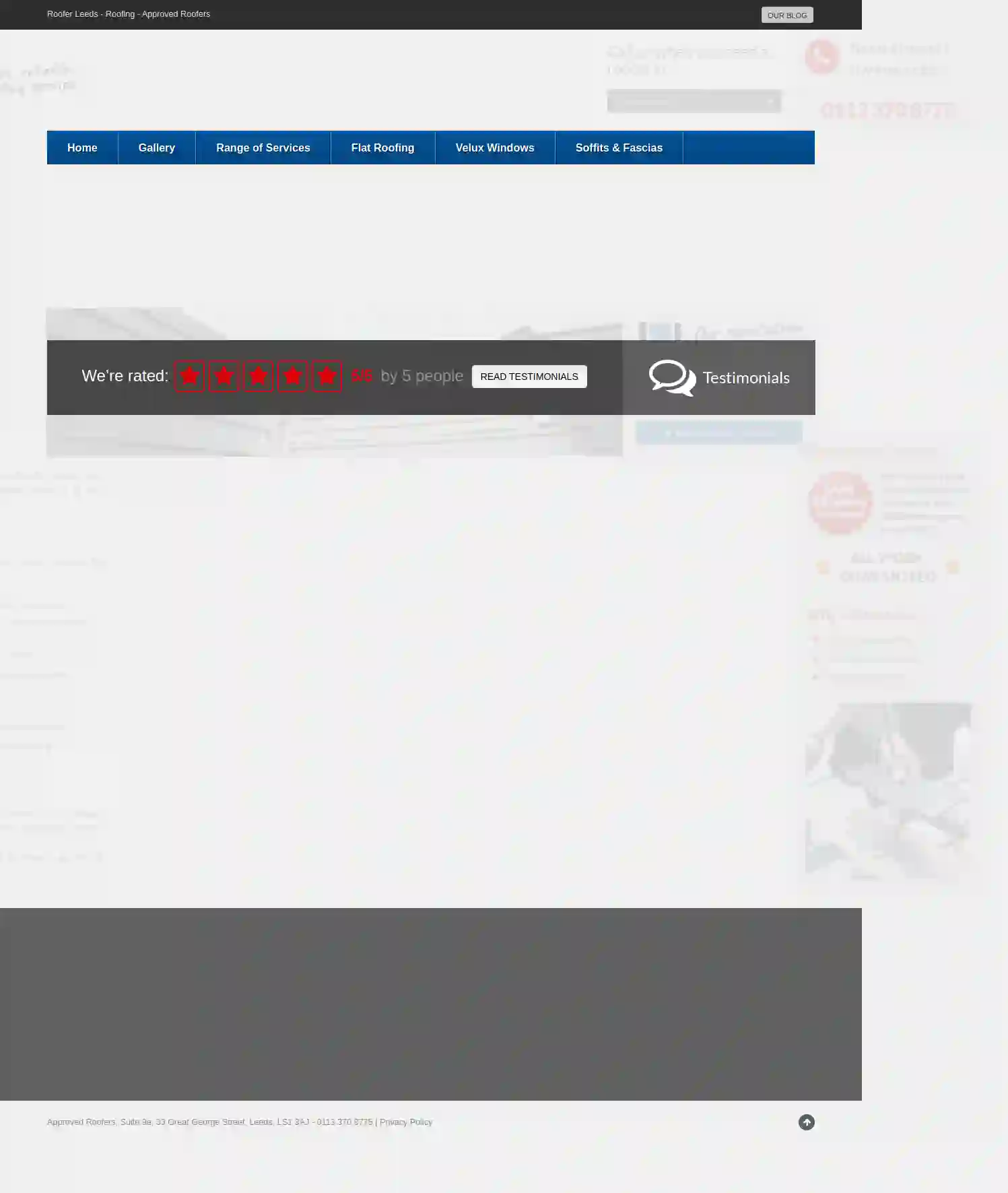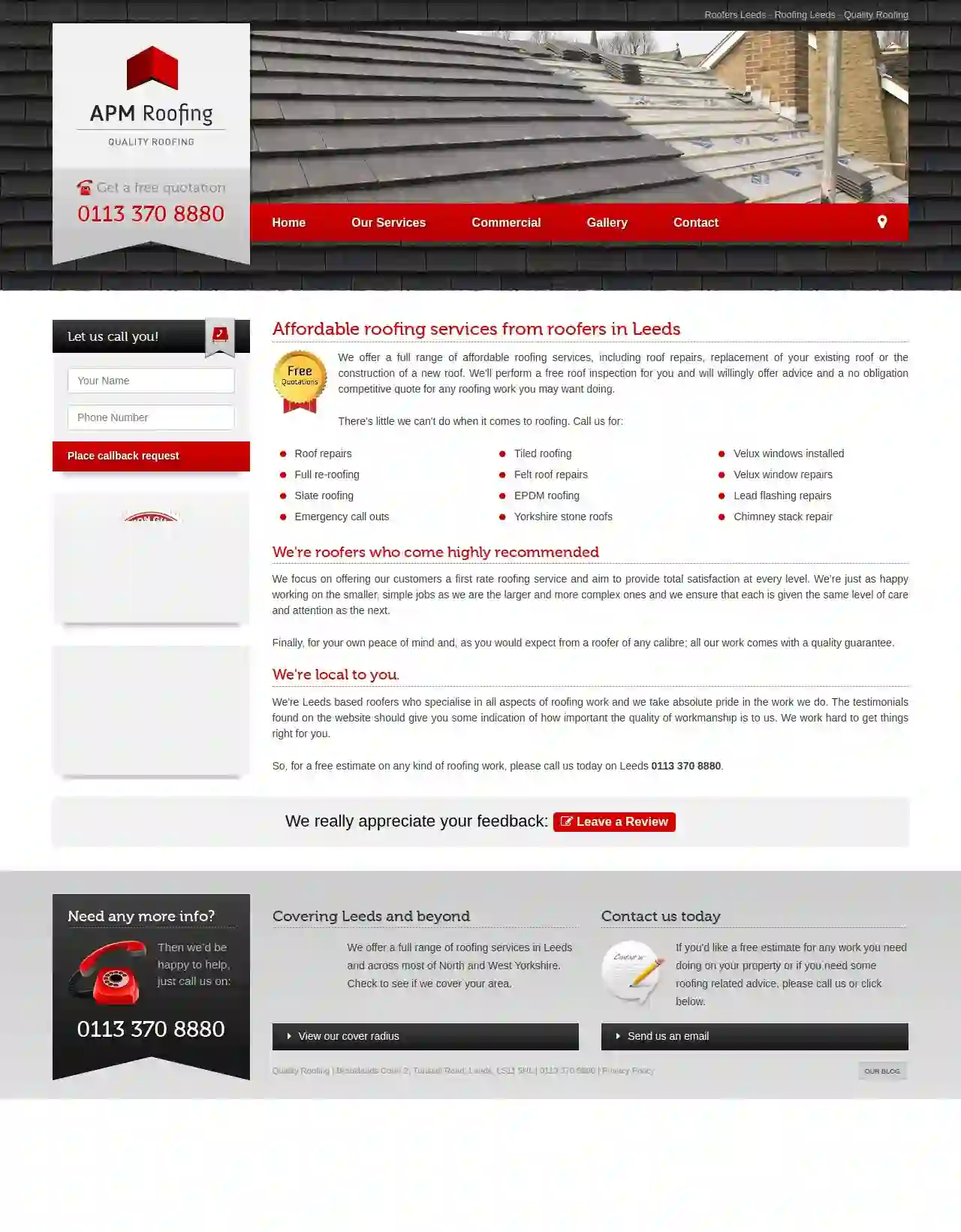Roofing Companies Garforth
Find top Roofers in Garforth
Get 3 FREE Roofing Services quotes for your project today! Compare profiles, reviews, accreditations, portfolio, etc... and choose the best offer.

E Taylor Roofing Limited
32 reviews5 Redberry Avenue, Heckmondwike, WF16 9FD, GBE Taylor Roofing & Son was established by Eric Taylor back in 1995. For over 23 years Eric and his dependable team have been serving a loyal customer base on both large and smaller scale projects. We pride ourselves on the quality of our work, we are strong believers in the word of mouth and having a good reputation being the strongest form of marketing. E Taylor Roofing can undertake Single Ply Flat Roofing and Facades. Recently we were commissioned by Sheffield Ophthalmology Hospital to install a Plywood base ready to accept insulation and Sarnafil membrane. You can view this and some of our other recent projects here. We always keep abreast of the latest roofing systems and as a result we are approved to install over 10 different manufactures systems, most of which are listed below. However, outside of the ones listed below we also have NVQ Level 2 Single Ply and Liquid plastics i.e. Decothane and Tor. E Taylor Roofing have CSCS and various safety cards for site vehicles and we are always willing to add to these as and when a contract calls for them. We are happy to undertake contracts both Nationally and Internationally and we provide all our own tools and equipment for on-site work. If you’d like to know more about the services we offer or would like a free no obligation quote for your next project please don’t hesitate to get in touch with us, we’d love to hear from you and discuss your requirements.
- Services
- Why Us?
- Accreditations
- Our Team
- Gallery
Get Quote
Marcher Roofing Limited
3.615 reviews54 Brudenell Rd, Leeds, LS6 1BD, GBMarcher Roofing is a family-run business based in Leeds since 1997. With over 25 years of roofing experience, they offer watertight solutions for residential, commercial, and industrial properties. They pride themselves on their experienced, skilled roofing specialists and provide comprehensive manufacturer-backed guarantees on all products used. Marcher Roofing understands the urgency of roof issues and offers a rapid response service, even working with Leeds City Council for emergency responses. They are committed to providing a quality service to both domestic and commercial customers, handling projects of all sizes. The company emphasizes a strict health and safety policy, ensuring the safety of both their team and clients. They also prioritize equality and diversity in all aspects of their business. Marcher Roofing's philosophy centers around being the preferred choice for customers, suppliers, and employees, providing the best roofing solutions at minimal cost and disruption.
- Services
- Why Us?
- Accreditations
- Our Team
- Testimonials
- Gallery
Get Quote
Sovereign Roofing Services
2.33 reviewsLeeds, LS9, GBWelcome to Sovereign Roofing Services, a growing family run professional roofing company. As a team, we have been working together for 18 years, but collectively have over 30 years of roofing experience. Within our website, you will find some examples of the range of roofing work we offer, including before, during, and after pictures of the services we have previously completed. Our team provides a wide range of roofing services, all of which are protected with fully comprehensive public liability insurance. We regularly complete work for property management agencies, property developers, and several large supermarket retail chains. However, this doesn't distract the company from its high-quality domestic service, and our service enables more and more people to recommend us to friends and family. We are based in Leeds, West Yorkshire, and are able to travel throughout the UK. Contact us today for free quotes. We can also recommend other building contractors should you require any other services.
- Services
- Why Us?
- Testimonials
- Gallery
Get Quote
AC Roofing
547 reviewsLeeds, GBAC Roofing is a small team of experienced and qualified Roofers in Leeds, Farnley. We're a team of friendly and experienced roofers operating throughout Leeds and the surrounding areas. We pride ourselves on offering a trustworthy service always taking before and after photos of our work so you can see the quality of our work. We offer a fully comprehensive roofing service including Emergency Roof Repairs, Roof Replacement, Flat Roofing, Velux Windows, Facias, Soffits and Guttering. Our roofs protect our home. While doing so our roofs are exposed to harsh weather which eventually will take its toll and your roof will start to show signs of wear and tear. When your roof is no longer suitable to be repaired it will often save you a lot of hassle and money to replace your roof in the long run. Our friendly team of roofing experts are here to offer you free advice.
- Services
- Why Us?
- Gallery
Get Quote
Approved Roofers
411 reviewsLeeds, GBRoofer Leeds - Roofing - Approved Roofers. Our blog. Call us when you need a roofer in: Your Location: Alwoodley & Adel, Armley & Lower Wortley, Beeston & Holbeck, Bramhope & Cookridge, Bramley, Garforth & Kippax, Guiseley & Menston, Headingley & Meanwood, Horsforth, Hunslet & Middleton, Leeds, Moortown & Chapel Allerton, Morley & Churwell, Otley & Ilkley, Pudsey & Farsley, Rothwell & Woodlesford, Seacroft & Crossgates, Yeadon & Rawdon. Need a roofer? Give us a call: 0113 370 8775. Toggle navigation Home Gallery Range of Services Re-roofing and New Roofs, Guttering, Chimney Repairs, Felt Roofs, Rubber Flat Roofing, Roof Repairs, Slate Roofing, Tiled Roofing, Fibreglass Roofs, Yorkshire Stone, Flat Roofing, Velux Windows, Velux Windows Bradford, Velux Windows Wetherby, Soffits & Fascias. View our gallery of work. Approved Roofers. We’re rated: 5/5 by 5 people. Read testimonials. Testimonials. When you need a quality Leeds roofer, choose the experts. If you're on the lookout for an excellent roofer in Leeds then we hope that you've found exactly what you've been looking for. With over two decades of experience and a wealth of knowledge, we're a great choice for all your roofing needs. We’re inexpensive, quick, thorough and everything we do is fully guaranteed.
- Services
- Why Us?
- Testimonials
- Gallery
Get Quote
Quality Roofing
GBQuality Roofing Leeds is a local roofing company based in Leeds, offering a full range of affordable roofing services across Leeds and most of North and West Yorkshire. We pride ourselves on providing a first-rate roofing service, ensuring total customer satisfaction. Our team of experienced roofers can handle everything from small repairs to large-scale projects, using high-quality materials and workmanship. We're committed to delivering exceptional results and peace of mind to all our clients. Whether you need roof repairs, a full re-roof, or any other roofing work, Quality Roofing Leeds is here to help. We offer free roof inspections and competitive quotes, so get in touch today for a no-obligation consultation.
- Services
- Why Us?
- Accreditations
- Our Team
- Testimonials
- Gallery
Get Quote
Roofclad Systems Leeds
51 reviewsStephenson Industrial Estate, Wylam Close, Washington, NE37 3BE, GBHere at Roofclad, we specialise in commercial and industrial roof and cladding refurbishment works. We have over 40 years of experience as one of the UK’s leading industrial roofing and cladding contractors. We have an incredibly skilled and highly trained workforce that advises you on the best and most cost-effective materials and design for any industrial or commercial building. All of our designs are fully covered by professional indemnity insurance. All our operatives are directly employed by the company and fully trained and certified installers for all major roofing and cladding manufacturers systems.
- Services
- Why Us?
- Gallery
Get Quote
Warrior Roofing Ltd
11 reviews100 Lewes Road, Brighton, Unit 10, The Business Centre, BN1 1AA, GBWarrior Roofing is a family-run business with over 20 years of experience in the roofing industry. We pride ourselves on providing high-quality workmanship and excellent customer service. We offer a wide range of roofing services, including new roof installations, roof repairs, and roof maintenance. We are fully insured and accredited, and we are committed to providing our customers with the best possible service. Our team of experienced roofers is dedicated to providing our customers with the highest quality workmanship. We use only the best materials and equipment, and we are always up-to-date on the latest roofing techniques. We are committed to providing our customers with a stress-free roofing experience. We offer a free no obligation quote on all of our services. Contact us today to learn more about our services or to schedule a free consultation.
- Services
- Why Us?
- Accreditations
- Our Team
- Testimonials
Get Quote
Simpson Dennis Roofing Services
4.771 reviewsFieldview House, 136 Kitson Hill Road, Mirfield, WF14 9QZ, GBDomestic Roofing SpecialistProfessional Roofing ServiceProfessional Roofing ServiceTrusted roofing firm serving residents of Kirklees, Wakefield & Calderdale for over 35 years. Local, Expert, Affordable Customer serivce & satisfactionSimpson Dennis Roofing Services has built up a reputation for reliability and workmanship of the highest quality, earned over the 35 years we have been in business. Customer satisfaction has been the key to our success with most of our contracts coming from word-of-mouth recommendation from the many satisfied customers. Learn more about usFull service roofing contractors Our ServicesWe offer the complete range of roofing services, including: Roof Repairs New Roofs Lead Work Chimney Work UPVC Plastics, Soffits & Fascias Velux Roof Windows & Skylights View our full range of servicesTrusted By Kirklees, Calderdale & Wakefield Homeowners For Over 35 Years.Your local domestic roofing specialist. YOUR LOCAL DOMESTIC ROOFING SPECIALIST We’re here to helpAreas we cover include: Mirfield, Huddersfield, Brighouse, Dewsbury, Wakefield, Heckmondwike, Liversedge, Cleckheaton, Ossett, Horbury, Batley, Birkenshaw and Birstall. Free Estimates All work guaranteedApproved by leading insurance companiesFull Tradesman Liability Insurance Reductions for OAPs Get in touch today Need a quote?Name: *Postcode: *Your Email: *Telephone: *Roofing requirement: *Submit Your Quote RequestThank you. We'll contact you shortly to arrange a suitable time to come to your property in order to provide you with a quote.×There was an error trying to send your message. Please try again later.×
- Services
- Why Us?
- Testimonials
- Gallery
Get Quote
Leeds Roofing
51 reviewsAlwoodley, LS17, GBSouth Yorkshire Roofing Network is a network of roofing professionals serving Alwoodley and surrounding areas. We offer a wide range of roofing services for both residential and commercial customers, including roof repairs, flat roofing, guttering, fascias & soffits, and more. Our members are experienced and qualified roofers who are committed to providing high-quality workmanship and customer service. If you need a reliable roofer in Alwoodley, contact South Yorkshire Roofing Network today. We understand that your roof is a vital part of your home or business, and we are dedicated to ensuring that it is in good condition. Whether you need a small repair or a complete roof replacement, our members can help. We offer free quotes and competitive prices, so you can be sure that you are getting the best value for your money. Contact us today to learn more about our services or to schedule a free consultation.
- Services
- Why Us?
- Gallery
Get Quote
Over 12,314+ Roofing Companies in our network
Our roofing pros operate in Garforth & beyond!
Roofyng.co.uk has curated and vetted Top Roofers in and around Garforth. Find the most reliable contractor today.
Frequently Asked Questions About Roofing Companies
- Clear the Area: Remove any vehicles, outdoor furniture, or other items from around your house to provide the roofing crew with easy access.
- Protect Landscaping: Cover plants, shrubs, and other landscaping elements near the house with tarps or plastic sheeting to protect them from falling debris.
- Clear the Attic: Remove or cover items stored in your attic, as dust and debris might fall through during the removal of the old roof.
- Notify Neighbors: It's courteous to inform your neighbors about the upcoming roof replacement project, especially if it's likely to be noisy or disruptive.
- Discuss Logistics with the Contractor: Coordinate with the roofing contractor regarding access to your property, parking arrangements, and any special instructions or concerns you have.
- Metal roofs: Reflect sunlight, reducing cooling costs.
- Tile roofs: Offer thermal mass, regulating temperature.
- Cool roofs: White or light-colored roofs with high solar reflectance.
- Green roofs: Vegetated roofs providing insulation and reducing heat absorption.
How do I prepare for a roof replacement?
What are some energy-efficient roofing options?
What is the difference between a roof overlay and a roof tear-off?
Roof Overlay: Installing a new layer of roofing material over the existing roof. It's less expensive and faster, but not always ideal.
Roof Tear-Off: Completely removing the existing roofing before installing a new one. More labor-intensive but allows for inspection and repairs to the roof deck.
A tear-off is typically preferred, but a roofing contractor can advise on the best approach for your situation.
What should I do with my old roof after replacement?
How do I prepare for a roof replacement?
- Clear the Area: Remove any vehicles, outdoor furniture, or other items from around your house to provide the roofing crew with easy access.
- Protect Landscaping: Cover plants, shrubs, and other landscaping elements near the house with tarps or plastic sheeting to protect them from falling debris.
- Clear the Attic: Remove or cover items stored in your attic, as dust and debris might fall through during the removal of the old roof.
- Notify Neighbors: It's courteous to inform your neighbors about the upcoming roof replacement project, especially if it's likely to be noisy or disruptive.
- Discuss Logistics with the Contractor: Coordinate with the roofing contractor regarding access to your property, parking arrangements, and any special instructions or concerns you have.
What are some energy-efficient roofing options?
- Metal roofs: Reflect sunlight, reducing cooling costs.
- Tile roofs: Offer thermal mass, regulating temperature.
- Cool roofs: White or light-colored roofs with high solar reflectance.
- Green roofs: Vegetated roofs providing insulation and reducing heat absorption.
What is the difference between a roof overlay and a roof tear-off?
Roof Overlay: Installing a new layer of roofing material over the existing roof. It's less expensive and faster, but not always ideal.
Roof Tear-Off: Completely removing the existing roofing before installing a new one. More labor-intensive but allows for inspection and repairs to the roof deck.
A tear-off is typically preferred, but a roofing contractor can advise on the best approach for your situation.